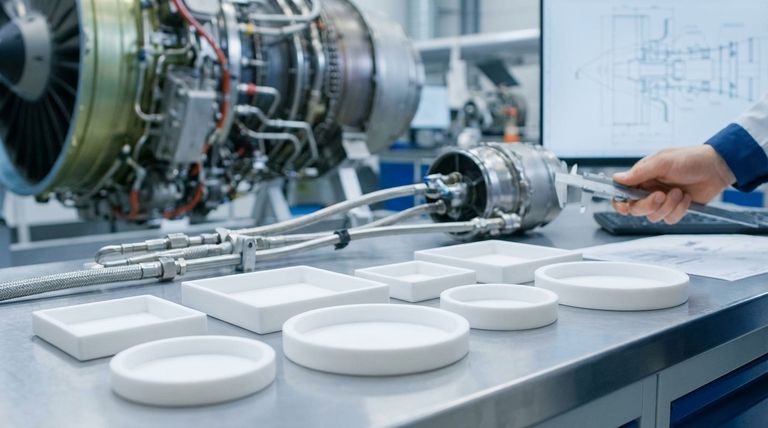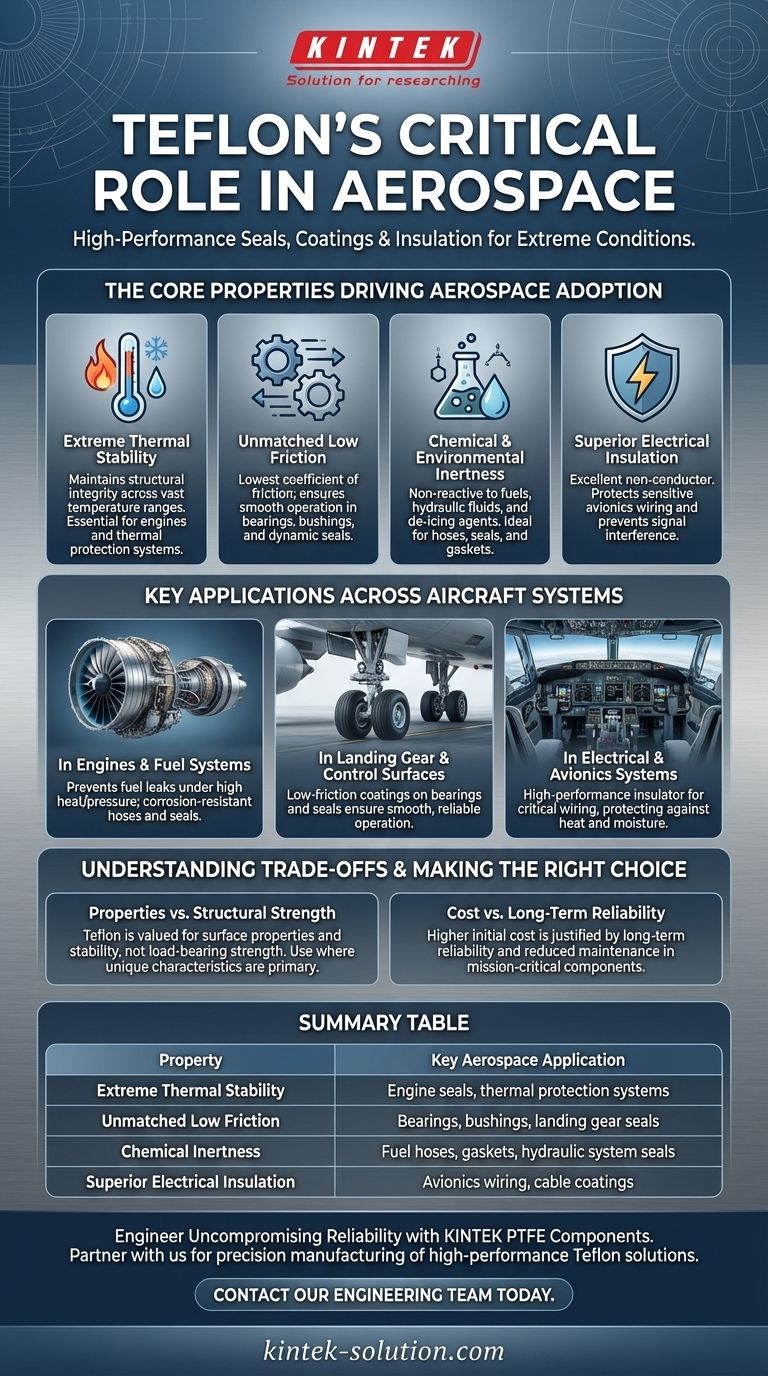In the aerospace industry, Teflon is critically used for high-performance seals, gaskets, low-friction coatings, and electrical insulation. Its applications span from engine components and fuel systems to landing gear and avionics, where its ability to withstand extreme conditions ensures operational reliability and safety.
The value of Teflon in aerospace is not its use in any single application, but its unique combination of properties. It solves the simultaneous challenges of extreme temperatures, chemical exposure, and friction that few other materials can withstand, making it essential for mission-critical components.

The Core Properties Driving Aerospace Adoption
To understand Teflon's role, we must first look at its fundamental characteristics. Its prevalence is a direct result of four key material properties that are perfectly suited for the harsh environment of flight.
Extreme Thermal Stability
Teflon, or PTFE, maintains its structural integrity and performance across a vast range of temperatures.
This stability makes it essential for components within hot engine compartments and as a key material in thermal protection systems.
Unmatched Low Friction
Teflon possesses one of the lowest coefficients of friction of any solid material, making it incredibly slippery.
This property is leveraged to coat bearings, bushings, and dynamic seals, reducing wear, minimizing maintenance, and improving the mechanical efficiency of moving parts.
Chemical and Environmental Inertness
The material is non-reactive and resistant to degradation when exposed to nearly all industrial chemicals and solvents.
This makes it the ideal choice for fuel hoses, seals, and gaskets that are in constant contact with aggressive jet fuels, hydraulic fluids, and de-icing agents.
Superior Electrical Insulation
Teflon is an excellent electrical insulator, meaning it does not conduct electricity.
This property is vital for coating wires and cables, protecting sensitive avionics from signal interference and short circuits in physically demanding conditions.
Key Applications Across Aircraft Systems
These core properties translate into specific, high-stakes applications throughout an aircraft where performance and reliability are non-negotiable.
In Engines and Fuel Systems
Seals and gaskets made from Teflon prevent leaks of fuel and lubricants under the high heat and pressure found in jet engines.
Its non-reactivity ensures that fuel lines and hoses do not corrode or degrade over their service life.
In Landing Gear and Control Surfaces
Low-friction Teflon coatings are applied to bearings and seals within landing gear mechanisms.
This ensures smooth, reliable operation during deployment and retraction, even after long periods of inactivity in extreme temperatures.
In Electrical and Avionics Systems
Teflon is a preferred high-performance insulator for critical wiring throughout the aircraft.
It protects against heat, moisture, and chemical exposure, ensuring the reliability of vital communication, navigation, and control systems.
Understanding the Trade-offs
No material is a universal solution. Being a trusted advisor means acknowledging where a material fits and where it does not.
Properties vs. Application
While incredibly versatile, Teflon is not a structural material. It is valued for its surface properties, chemical stability, and temperature resistance—not its load-bearing strength.
Engineers must specify its use where its unique characteristics are the primary requirements, rather than for components that demand high tensile or compressive strength.
Cost and Manufacturing
High-performance materials like Teflon typically come with higher procurement and specialized manufacturing costs compared to conventional plastics or rubbers.
However, the benefits in long-term reliability and reduced maintenance cycles almost always justify the initial investment for critical aerospace components where failure is catastrophic.
Making the Right Choice for Your Goal
Your specific engineering challenge will determine how best to leverage Teflon.
- If your primary focus is reliability in moving parts: Utilize Teflon for its low-friction properties in bearings, bushings, and dynamic seals to minimize wear and ensure smooth actuation.
- If your primary focus is fluid containment in harsh environments: Specify Teflon for gaskets, seals, and hoses that will be exposed to aggressive fuels or extreme temperatures.
- If your primary focus is protecting sensitive electronics: Employ Teflon as a wire and cable insulator to guarantee signal integrity and prevent failure from heat or chemical exposure.
By understanding its core strengths and limitations, you can engineer systems that meet the uncompromising reliability standards of the aerospace industry.
Summary Table:
| Property | Key Aerospace Application |
|---|---|
| Extreme Thermal Stability | Engine seals, thermal protection systems |
| Unmatched Low Friction | Bearings, bushings, landing gear seals |
| Chemical Inertness | Fuel hoses, gaskets, hydraulic system seals |
| Superior Electrical Insulation | Avionics wiring, cable coatings |
Engineer Uncompromising Reliability with KINTEK PTFE Components
When mission-critical performance is non-negotiable, partner with a supplier who understands the extreme demands of aerospace engineering. KINTEK specializes in the precision manufacturing of high-performance PTFE (Teflon) components—from custom seals and liners to complex labware—for the semiconductor, medical, laboratory, and industrial sectors.
We help you leverage Teflon's unique properties to solve your toughest challenges:
- Enhance Reliability: Our components ensure long-term performance in harsh environments, reducing maintenance cycles.
- Improve Efficiency: Low-friction coatings and seals minimize wear on moving parts.
- Protect Critical Systems: Superior insulation and chemical resistance safeguard sensitive avionics and fluid systems.
From initial prototypes to high-volume production, we deliver the precision and quality your applications demand.
Ready to specify the right PTFE solution for your project? Contact our engineering team today to discuss your requirements.
Visual Guide

Related Products
- Custom PTFE Parts Manufacturer for Teflon Containers and Components
- Custom PTFE Parts Manufacturer for Teflon Parts and PTFE Tweezers
- Custom PTFE Sleeves and Hollow Rods for Advanced Applications
- Custom PTFE Teflon Balls for Advanced Industrial Applications
- Custom PTFE Square Trays for Industrial and Laboratory Use
People Also Ask
- What is the working temperature range of PTFE? Master Extreme Heat and Cryogenic Applications
- What are the best practices for achieving tight tolerances in Teflon (PTFE) machining? Master Precision for Demanding Applications
- What is PTFE commonly known as and what are its unique properties? Unlock Unmatched Chemical & Thermal Resistance
- What are the unique properties of PTFE? Unlock Unmatched Performance in Demanding Applications
- What are some common applications of machined PTFE? Leverage its Unique Properties for Demanding Applications



















